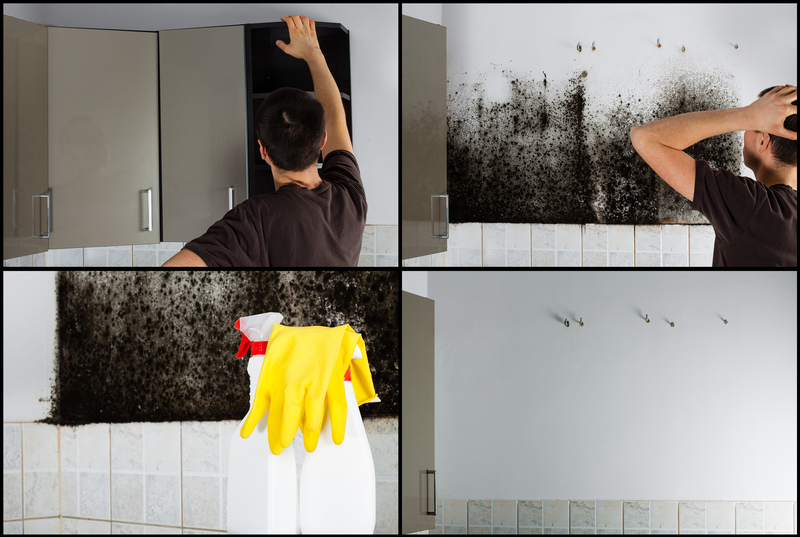The Science Behind Mold and Mildew: Understanding the Causes of Damp Odors
Posted on 28/07/2024

Mold and mildew are common household problems that can not only damage your property, but also put your health at risk. These unpleasant and musty odors often arise from damp areas in the house, such as bathrooms, basements, or even hidden corners. But have you ever wondered what causes these pesky odors and how to effectively deal with them? In this article, we will delve into the science behind mold and mildew, helping you understand the root causes of these damp odors.
What is Mold and Mildew?
Mold and mildew are types of fungi that thrive in warm, moist environments. They reproduce by releasing tiny spores into the air, which can spread easily and quickly. These spores can easily enter our homes through open windows or doors, on our clothes or pets, or even through heating and cooling systems. When they find a suitable environment with enough moisture, they can start growing rapidly.
Causes of Damp Odors: Moisture & Humidity
The main cause of mold and mildew growth is excess moisture. This can occur due to a variety of reasons such as a leaky roof, broken pipes, poor ventilation, or flooding. Areas in your home that are prone to dampness, such as bathrooms or basements, are especially vulnerable to mold and mildew growth.
Moreover, high humidity levels also contribute to the growth of mold and mildew. The ideal humidity level inside a house should be around 40-50%. Anything above that encourages the growth of these fungi. During hot and humid weather conditions, it is important to use dehumidifiers or air conditioners to maintain a comfortable level of humidity inside your home.
Health Risks Associated with Mold and Mildew
Exposure to mold and mildew can pose serious health risks. These fungi release numerous micro-toxins into the air which can affect your respiratory system. Prolonged exposure to mold and mildew can cause allergy symptoms such as coughing, sneezing, watery eyes, and breathing difficulties. In some cases, it can also lead to more serious issues such as asthma or lung infections. People with weakened immune systems, such as young children, pregnant women, or the elderly, are more susceptible to the health risks associated with mold and mildew.
Prevention and Remediation
The key to dealing with mold and mildew is prevention. Regularly checking for leaks or any signs of moisture in your home is crucial. It is also important to have proper ventilation in high-humidity areas like bathrooms and kitchens. Using exhaust fans or opening windows while cooking or showering can help reduce excess moisture.
If you do find mold and mildew growth in your home, it is important to address it immediately. Using commercial cleaning products designed specifically for mold and mildew removal is one way to tackle the problem. However, these products often contain harsh chemicals that can be harmful to both yourself and the environment.
An alternative, natural solution is using a mixture of white vinegar and water to clean affected areas. Vinegar has antimicrobial properties that can effectively kill mold and mildew spores while being safe for your family and pets.
Pros and Cons of Mold Remediation
While there are several advantages of taking immediate action against mold and mildew growth, there are also some potential drawbacks to keep in mind. On the positive side, getting rid of these fungi can significantly improve indoor air quality which is beneficial for your overall health. It can also prevent further damage to your property, saving you from costly repairs in the future.
However, if not done properly, remediation can potentially release even more harmful spores into the air. It can also be expensive depending on the extent of the damage and may require professional help in severe cases.
Tips for Preventing Damp Odors
- Regularly check for any signs of moisture or leaks in your home.
- Keep indoor humidity levels between 40-50%.
- Use exhaust fans or open windows to improve ventilation in high-moisture areas.
- Fix any leaks or plumbing issues immediately.
- Use a natural solution such as vinegar to clean mold and mildew.
Key Takeaways
Mold and mildew growth is caused by excess moisture and high humidity levels. It can pose serious health risks, especially to vulnerable individuals. Prevention is key, but if remediation is necessary, it should be done safely and effectively. Regular maintenance and cleaning can help prevent damp odors and ensure a healthy living environment for you and your family.
In conclusion, understanding the science behind mold and mildew can help you better deal with these pesky damp odors. With proper prevention methods and timely remediation, you can keep your home free from these fungi and maintain a healthy living space. Remember to always be vigilant for signs of moisture and take immediate action to prevent further growth.






